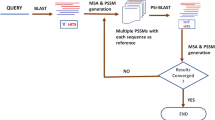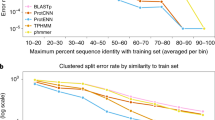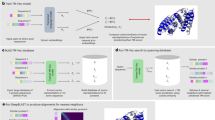Abstract
The explosive growth in the number of sequenced genomes has created a flood of protein sequences with unknown structure and function. A routine protocol for functional inference on an input query sequence is based on a database search for homologues. Searching a query against a non-redundant database using BLAST (or more advanced methods, e.g. PSI-BLAST) suffers from several drawbacks: (i) a local alignment often dominates the results; (ii) the reported statistical score (i.e. E-value) is often misleading; (iii) incorrect annotations may be falsely propagated. Several systematic methods are commonly used to assign sequences with functions on a genomic scale. In Pfam (1) and resources alike, statistical profiles (HMMs) are built from semi-manual multiple alignments of seed homologous sequences. The profiles are then used to scan genomic sequences for additional family members. The drawbacks of this scheme are: (i) only families with a predetermined seed are considered; (ii) the query must have a detectable sequence similarity to seed sequences; (iii) attention to internal relationships among the family members or the relations to other families is lacking; (iv) family membership is often set by pre-determined thresholds.An alternative to profile or model based methods for functional inference relies on a hierarchical clustering of the protein space, as implemented in the ProtoNet approach (2). The fundamental principle is the creation of a tree that captures evolutionary relatedness among protein families. The tree construction is fully automatic, and is based only on reported BLAST similarities among clustered sequences. The tree provides protein groupings in continuous evolutionary granularities, from closely related to distant superfamilies. Clusters in the ProtoNet tree show high correspondence with homologous sequence (i.e. Pfam and InterPro), functional (i.e. E.C. classification) and structural (i.e., SCOP) families (3). A new clustering scheme (4) has provided an extensive update to the ProtoNet process, which is now based on direct clustering of all detectable sequence similarities. Herein, we use the ProtoNet resource to develop a methodology for a consistent and safe functional inference for remote families. We illustrate the success of our approach towards clusters of poorly characterized viral proteins. Viral sequences are characterized by a rapid evolutionary rate which drives viral families to be even more remote (sequence-similarity-wise). Thus, functional inference for viral families is apparently an unsolved task. Despite this inherent difficulty, the new ProtoNet tree scaffold reliably captures weak evolutionary connections for viral families, which were previously overlooked. We take advantage of this, and propose new functional assignments for viral protein families.
Similar content being viewed by others
Article PDF
Author information
Authors and Affiliations
Corresponding author
Rights and permissions
About this article
Cite this article
Loewenstein, Y., Linial, M. Safe Functional Inference for Uncharacterized Viral Proteins. Nat Prec (2008). https://doi.org/10.1038/npre.2008.2187.1
Received:
Accepted:
Published:
DOI: https://doi.org/10.1038/npre.2008.2187.1



